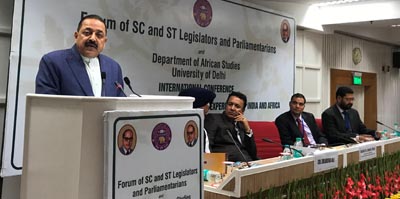
Excelsior Correspondent
NEW DELHI, Feb 22: Union Minister of State (Independent Charge) of the Ministry of Development of North Eastern Region (DoNER), MoS PMO, Personnel, Public Grievances & Pensions, Atomic Energy and Space, Dr Jitendra Singh said here today that “inclusive” growth is inherent to the rise of “New India”.
Addressing the Plenary Session of the International Conference of “Inclusive Tribal Congregation”, Dr Jitendra Singh said, Prime Minister Narendra Modi’s dream of “New India” is inspired by equitable growth of each section of society, regardless of the socio-economic background.
He said, the Modi Government has refrained from launching inconsequential campaigns like “Garibi Hatao”, which were practiced by the earlier Governments without achieving eradication of poverty. On the other hand, this government has envisaged for itself the objective of empowering the poor to enable them to eradicate their own poverty, for which the government has rolled out several schemes to offer support, he added.
In the global world of today, where distances and time – gaps have tremendously narrowed down, Dr Jitendra Singh said, “inclusiveness” is the only option available to move forward. But the credibility of Prime Minister Modi and his team lies in the fact that they are inspired by the ideology of “inclusiveness” which was postulated half a century ago by Pt. Deen Dayal Upadhyay, who defined the concept of “Antyoday”, he added.
Dr Jitendra Singh said, a series of innovative new programmes initiated by the Modi Government in the last three years have been inspired by the idea of making every section of Indian society a part of India’s growth story and the most striking example of this are schemes like “Jan Dhan Yojana”, “PM Krishi Vikas Yojana”, etc. Similarly, this approach of “inclusiveness”, he said, has been seriously conscious of the fact that over 70% of population of India today is below the age of 40 years and schemes like “Start-up India, Stand-up India” or “Mudra Yojana” are meant to ensure their “inclusiveness”.
Speaking on the occasion, Chowdhary Zulfkar Ali, Minister for Tribal Affairs of J&K said that only education can bring desired changes and every tribal community must focus on educating their wards so that to compete with mainstream. He appreciated the role of World Organizations, Government of India and Government of Jammu & Kashmir for focused attention on tribal issues.
Calling upon conducting more research on the tribals, Zulfkar said that tribals in India have always been the source of study for Sociologists and Anthropologists but they have been treated differently by different scholars depending upon their individual background, experience and interest. “There has always been difference of opinion regarding suitable model for the integration of the tribal’s to the mainstream of Indian life” he said, giving example of Census 1931 in which it was forcefully stick to the point that the tribal’s were distinct from non-tribal’s as far as religion is concerned.
Stressing on provision of education for the tribal people, Zulfkar said that the recruitment of qualified teachers and determination of the appropriate language of instruction also remain trouble-some in bringing positive results. He said there is a need to have focused attention on the subject so that they can be made fully dependent on their own.

